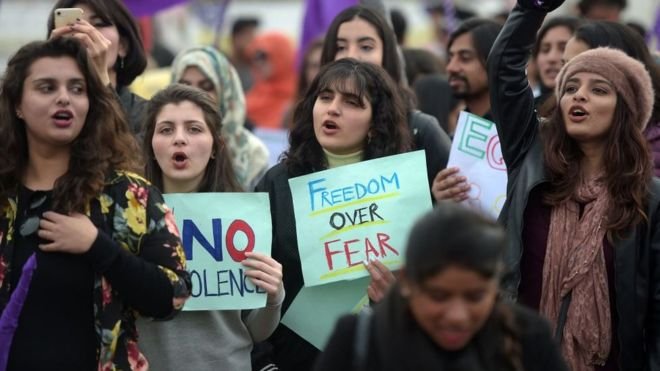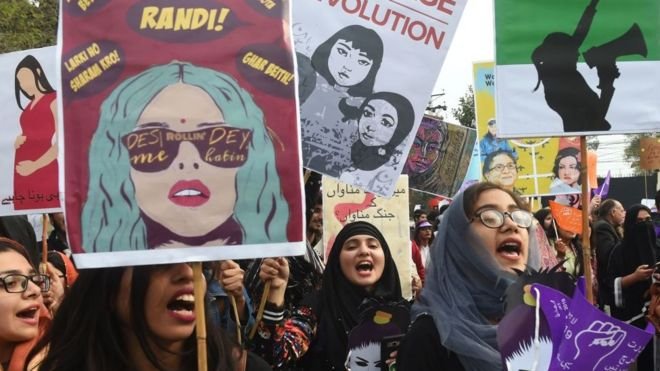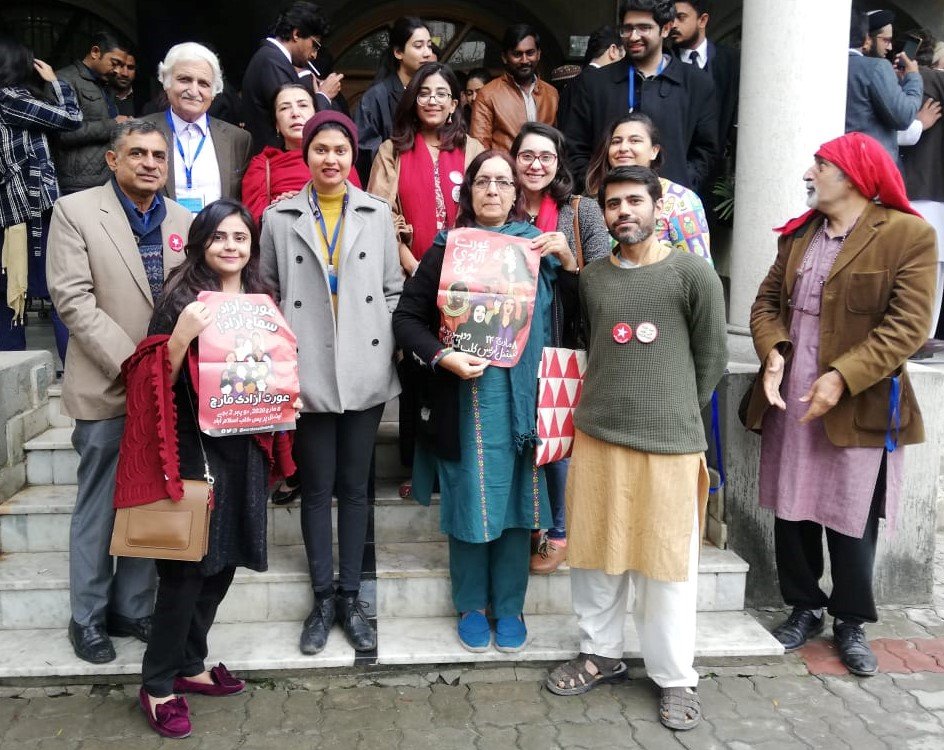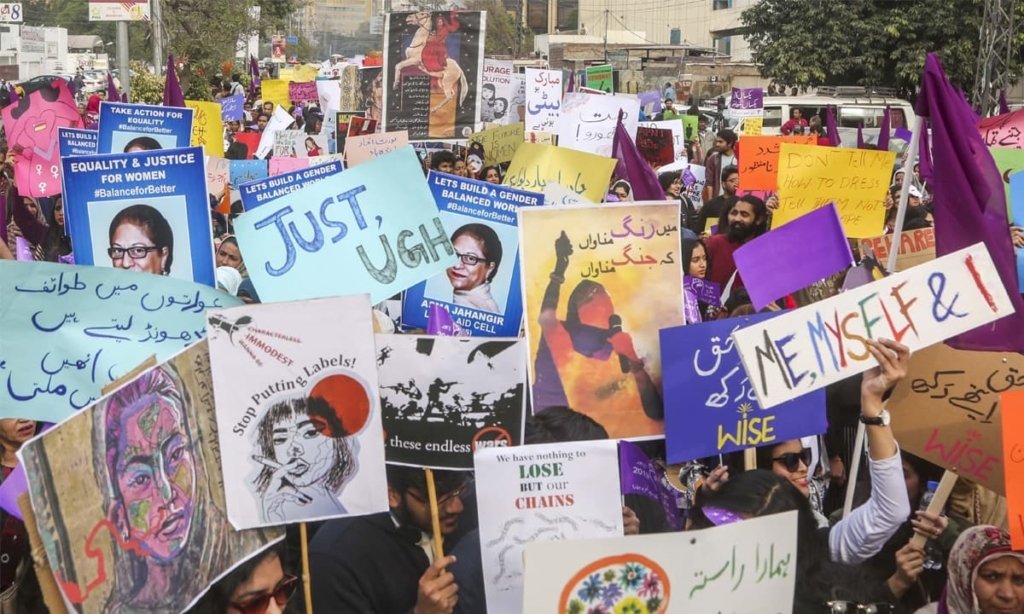
Marches will be held in Islamabad, Lahore, Faisalabad, Hyderabad, Peshawar, Karachi and Quetta
High Asia Herald Report
The brave and resolute women of Pakistan take to the streets on March 8, for equal space, rights in the face of violent threats by the conservative groups and uninformed commercial media spreading hysteria, fear and obfuscation around trivial slogans and posters such as ‘meri jism meri marzi’.
Aurat Azadi March or Aurat March (women’s liberation march) has been held since 2018 in many cities across Pakistan to coincide with International Women’s Day on 8 March. The organisers and participants have been facing intense backlash, online including death and rape threats.
“It is no small feat in a conservative Muslim country where many women often don’t feel safe in public places because of the harassment they often endure,” reports British Broadcasting Corporation (BBC).
And this year, voices on both sides of the debate have grown louder in the lead-up.
“There’s a deep conflict in the society that we live in, about the right of women to ask for their rights; to be mobile, to be out in the streets,” says a 38-year-old organiser in Karachi, who did not want to be identified.
The idea for Aurat March began when a few women decided to mobilise against violence and harassment taking inspiration from similar events in the US, Europe and Latin America.
It has since evolved into a wider movement, including transgender people, demanding equal rights, an end to patriarchy, militarization of society, economy and institutions, outdated tribal and feudal customs, traditions and violence against women and girls, better laws to protect women.
We are challenging the status quo, patriarchy, feudal and tribal mindset, says one of the organisers’
But it was the slogans and signs held up in 2019 which drew wider attention to the movement. Participants faced criticism and abuse in the mainstream media, alongside intense trolling online.
It was the rallying cry “mera jism, meri marzi”, which translates to my body, my choice, in particular which touched a nerve last year and continues to cause controversy ahead of this year’s march.
Aurat March proponents have argued it is about a woman’s control over her own body, but the phrase was seen by critics as obscene, having a sexual connotation and going against the highly prized expectation of modesty in a woman.

The story behind “mera jism meri marzi” (my body, my choice)
Noor (not her real name) created a poster with these words for last year’s march. She came up with the slogan because she wanted to highlight the right of women to have agency, to choose what she wants to wear and do with her own body, without fear of harassment or rape.
She says the negative reaction has scared her so much that she now finds it difficult to speak with her real name. Noor was speaking to BBC Urdu.
“One way [to address issues] is to continue slowly working, and hope to achieve a result maybe a few decades later. The other approach is to just snatch your rights because it has been too long, it has been too hard and it has been too traumatic,” says a 28-year-old volunteer, who identifies as gender fluid.
There have been attempts by the group to explain the ideas behind the movement through their social media channels and community outreach.
But that doesn’t seem to have prevented the deep divisions and tense exchanges ahead of this year’s event. If anything they’ve grown more vitriolic.
Posters and murals put up by WDF organisers in Islamabad have been vandalised. Social media posts asking for volunteers have unleashed a barrage of misogynistic abuse.
“We are probably going faster than the society can digest… but we are helping them unlearn the toxicity that was taught to them by the society, culture and religion and we are trying to make them learn a new de-gendered system,” the volunteer acknowledges.
The controversy reached the courts in Lahore and Islamabad where petitions were filed to stop the march from going ahead, arguing that its aim was to “spread anarchy, vulgarity, blasphemy and hatred” of Islam.
The courts threw bout the petitions and allowed the march.
The debate reached a fever pitch last week when a playwright Khaliur Rehman Qamar, known for his misogynistic views, verbally abused Marvi Sirmed, a rights activist and journalist during a live television show, drawing condemnation of his outburst.
Mahira Khan, one of Pakistan’s most famous actresses, said on Twitter that she supported the march but warned against using provocative placards.
“The fact that women are unable to demand their human rights without being put in very real danger underscores just how important the Aurat March is.”
The volunteer says they are fearful of acid attacks, bomb threats, stalkers and even doxing – the publication of someone’s personal details online.
“We are scared. But if we are not scared, if we don’t have fear, how do we expect the change to come?”
Come Sunday, even the fear won’t keep them confined to the veil and four walls anymore.
“Even if I were not sure about going to the march earlier, I am now definitely attending it, come rain or shine, and will be even taking my brother along,” said Islamabad-based Rubab Swati, 22, referring to the Aurat March (AM) taking place on Sunday (today).
A microbiologist at a pharmaceutical company, and artist, she had joined a group of young artists last week, who were preparing a mural on the boundary wall of a home in G-7 sector. They said they had taken permission from the owners. “We knew AAM would be passing by this place and wanted to pay tribute to them,” said Minhajul Arifeen, 25, one of the artists.
Sadly, the mural was vandalised by Jamia Hafsa madressah students because they found it offensive. “Yes, our women did it,” said Umm-e-Hassaan, Jamia Hafsa spokesperson. “It was offensive to our eye and if they can portray their point of view so can we by defacing it.”
The half-complete painting showed two young girls, with one having draped her arm around the other.
“There was a political message with an aspiration that Pakistani society reaches that level of maturity where it empowers its womenfolk to feel safe moving about freely unsupervised,” Minhaj told Dawn newspaper.
Benazir Jatoi, an Islamabad-based lawyer, who will attend the AAM because she believes “movements like these bring change”, has received several calls from people inquiring about Sunday’s plan.
“They are angry at the mural episode and say they want to lend their support by showing up,” she said, adding: “Plus the Khalilur Rehman-Marvi Sirmed war of words gave the march some impetus.”
“I am hoping that doctors, students, young professionals and especially working women and domestic help turn up,” as the event certainly should not be “NGO-ised” nor be “hijacked or dominated by any one political party”.
Last year, participants in Islamabad had witnessed an ugly tussle between women participants of different political parties. “I think AM is the perfect event to harmonise political differences and rise above party politics,” Benazir said, adding haters will keenly be watching for fissures within the movement.
For journalist and Women’s Action Forum member, Farieha Aziz, “Trivialising slogans on placards is harmful because they address the very root of the problem: gender roles and social conditioning. It is attitudes faced by women on a daily basis and dismissal of their concerns and experience that contribute to their oppression and hold them back.”
The English media have been supporting the Aurat march asking the state to ensure foolproof to the marchers.
Dawn in its editorial says: “The brave and resolute women of this country are marching today to demand the justice, equality and respect they deserve… an end to violence, abuse and discrimination against women.
“In the past two years, this movement has attracted thousands of protesters and has remained peaceful and well-organised. Armed with placards, posters and an unflinching determination, women are taking to the streets in a public show of power, despite the hatred and vitriol spewed on them by their detractors.
Retired Justice Nasira Iqbal while addressing a press conference in karach said 89 per cent of the Pakistani women were subjected to domestic violence and abuse. She also said that owing to aborted foetuses, malnutrition and disease-driven infant mortality, some five million girls are missing from the country’s population according to UN statistics.
The World Economic Forum places Pakistan in the gender disparity index at 151 out of the listed 153 nations.
Our ranking in the disparity of healthcare with regards to women puts us at 149 of 153.
“Making a dent in the status quo is not easy. If you aspire to overthrow it, your task becomes that much more onerous,” writes Dawn’s former Editor Abbas nasir in his latest column.
The Islamabad High Court (IHC) on Friday dismissed a petition seeking to restrict the Aurat March as non-maintainable and not justiciable.
IHC Chief Justice Athar Minallah dismissed the petition saying the right of assembly is a fundamental right but he stated that the court expects that the participants of the march will exercise their rights in accordance with the law.
While dismissing the petition, the top judge highlighted the following points:
Courts across the country are inundated with litigation brought by women against the denial of their inheritance rights. “Mothers, sisters and daughters are denied their rights which have been expressly given to them by Almighty Allah in unambiguous terms.”
In this context, and in view of widespread violence prevalent against women in the country, the International Women’s Day should be observed as “a day of introspection”.
“The petitioners and citizens are expected to take [the march] as an opportunity to introspect and demonstrably show outrage against the practices, which are flagrantly offensive to the injunctions of Islam e.g. mindsets that do not welcome the birth of a female child, honour killings, rape, practices such as wani, swara, karo-kari, etc. If this happens, then many innocent ‘Zainabs’ will be saved from being treated savagely.”
The words used in Aurat March slogans “should not be given meanings according to the mindset of a certain section of society and that too, contrary to the explanation given by the proponents of the march”.
“Tribal patriarchal traditions and societal norms, based on egos and obscure insecurities […] have to be defeated through collective struggle so that no mother, sister or daughter suffers the agony of litigation to assert rights of inheritance nor innocent ‘Zainabs’ have to endure unthinkable pain and agony.”
However, Justice Minallah wrote in the eight-page judgment that “this court expects that the proponents of the ‘Aurat March’ will exercise their constitutional rights in accordance with law having regard to conduct that is consistent with the norms of decency.”
The event is an opportunity for its participants to “prove those who doubt their intentions wrong”, the verdict said.
‘Important to see march in positive light’
“The women’s slogans are that they be given the rights that Islam grants them. Can we interpret their slogans by ourselves?” the judge questioned.
The judge also questioned the petitioners’ counsel on how many women in the country were given the right to an inheritance, alluding to the difficulties they face despite clear Islamic laws in place.
In light of this highly charged and toxic environment, it is incumbent upon the federal and provincial governments to ensure that the Aurat March participants are provided security and that those threatening intimidation and violence are stopped, Justice Minallah ordered.
The authorities will be held responsible if any violent confrontation occurs at peaceful demonstrations where citizens are exercising their democratic rights, he warned.
Among the mainstream political parties only PPP and the leftwing Awami Workers Party have vocal in supporting the Aurat March.
They reminded the government that
Speaking in the upper house today, PPP Senator Krishna Kumari Kohli condemned playwright, saying he had disrespected all women through his remarks.
She said Rehman should not be invited to any talk show in the future. Senator Sassui Palijo, another PPP lawmaker, expressed similar thoughts, saying it was time that the character assassination of women in the country ended.
However, other male senators in the upper house were less unequivocal in their censure of Rehman’s remarks.
Jamaat-i-Islami Senator Mushtaq Ahmad Khan said women’s rights should not be turned into a “gender clash”.
PML-N Senator Mushahidullah Khan went one step further and demanded an investigation of the march’s organisers.
 AWP to stand with Aurat March
AWP to stand with Aurat March
“The Awami Workers Party (AWP) extends solidarity with brave women of Pakistan fighting worst kind of patriarchy, obscurantism, extremism, repression, militarization of politics and society.
“On this occasion, we commemorate all our comrades who laid their lives in the struggle for women’s liberation, equal rights, against patriarchy, oppression, and exploitation,” stated the party president Yousuf MustiKhan.
“We also remember the brave women from Palestine to Kashmir, Lebanon to Iran, Chile to Brazil and other countries who are fighting against their despotic rulers, state oppression, imperialism and Zionism,” he added.
“We salute the women of Balochistan, Khyber-Pakhtunkhwa, Sindh, Punjab, Kashmir and Gilgit-Baltistan who are struggling for their rights and for the freedom of their loved ones.”
“We condemn in the strongest possible terms the misogynist propaganda and threats hurled against women marchers by rightwing, obscurantist, religious bigots as well as commercial media for distorting the genuine demands of women and creating hysteria and fear in the country,” said AWP secretary-general Akhtar Hussain Advocate.
“We welcome the judiciary for their bold decisions on the Aurat March and demand the government and the administration to provide foolproof security to the marchers and refrain from appeasement of the extremist elements,” he said.
As our society is seething under the patriarchal, fascist and militarist violence, we renew our call for a revolutionary struggle against oppressive state policies, violence and exploitation in all forms and manifestations, religious fundamentalism, racism and patriarchy, Mr Mustikhan said.
The party acknowledges that women and marginalised people cannot be free unless the inter-linked structures of violence and exploitation are dismantled.
Millions of working women are exploited daily at homes, working places, offices, at farms in rural areas robbing them of the opportunities, time and resources to fulfil their dreams and potential. The alarming ratio of violence and harassment rife in Pakistani society has made both homes, public places unsafe for women and girls, Ms Hussain said. They cannot go through life without experiencing the traumas of physical, sexual, mental and emotional violence that debilitate them, keeping women away from public spaces, education, work and power.
Several women die daily from a lack of basic medical and reproductive health care, due to apathy of the state, institutional systems, shaped by patriarchs and justified by a self-serving religious clergy.
The AWP calls upon all working class women, men, youth to get united and launch struggle for the restoration of the climatic balance necessary for the continued sustenance of human life, for a world without violence and fear, in which all our aspirations can co-exist without any exploitation and prejudices, they said.

The High Asia Herald is a member of High Asia Media Group — a window to High Asia and Central Asia

